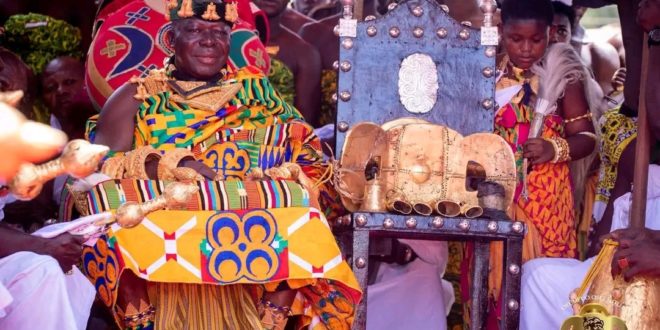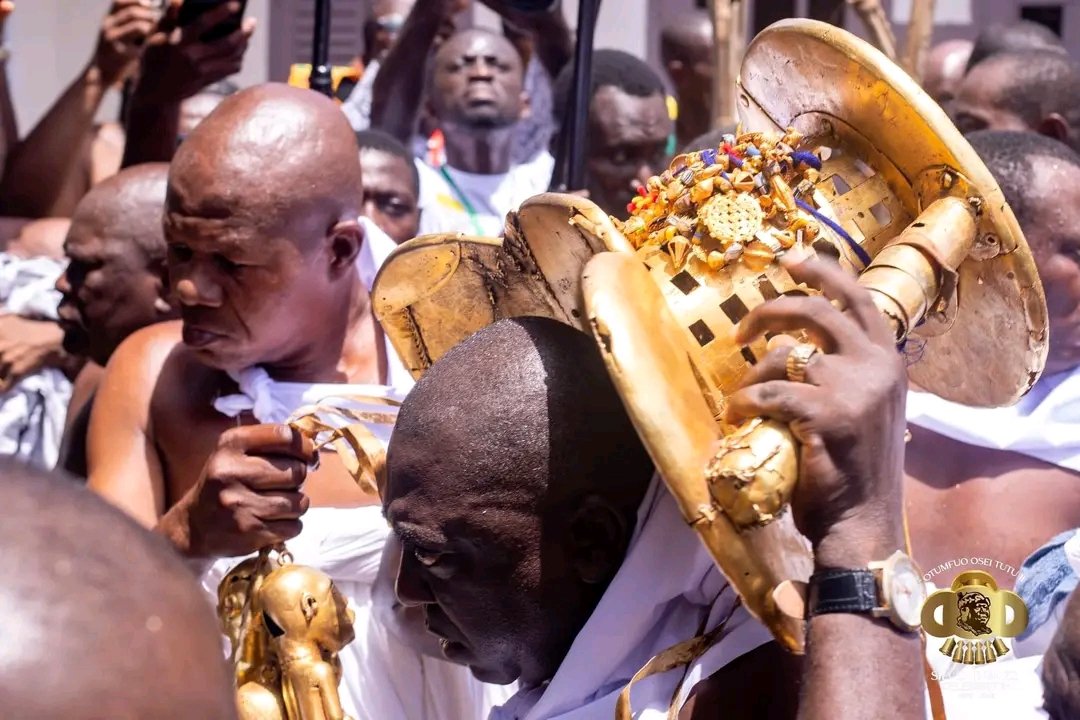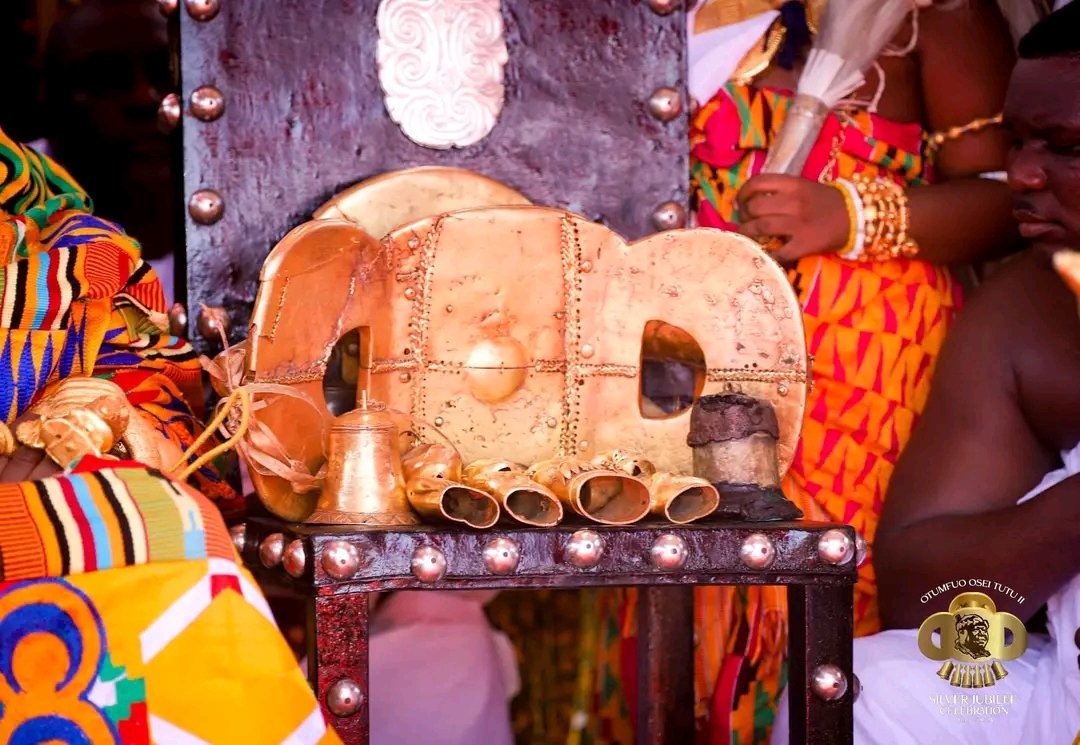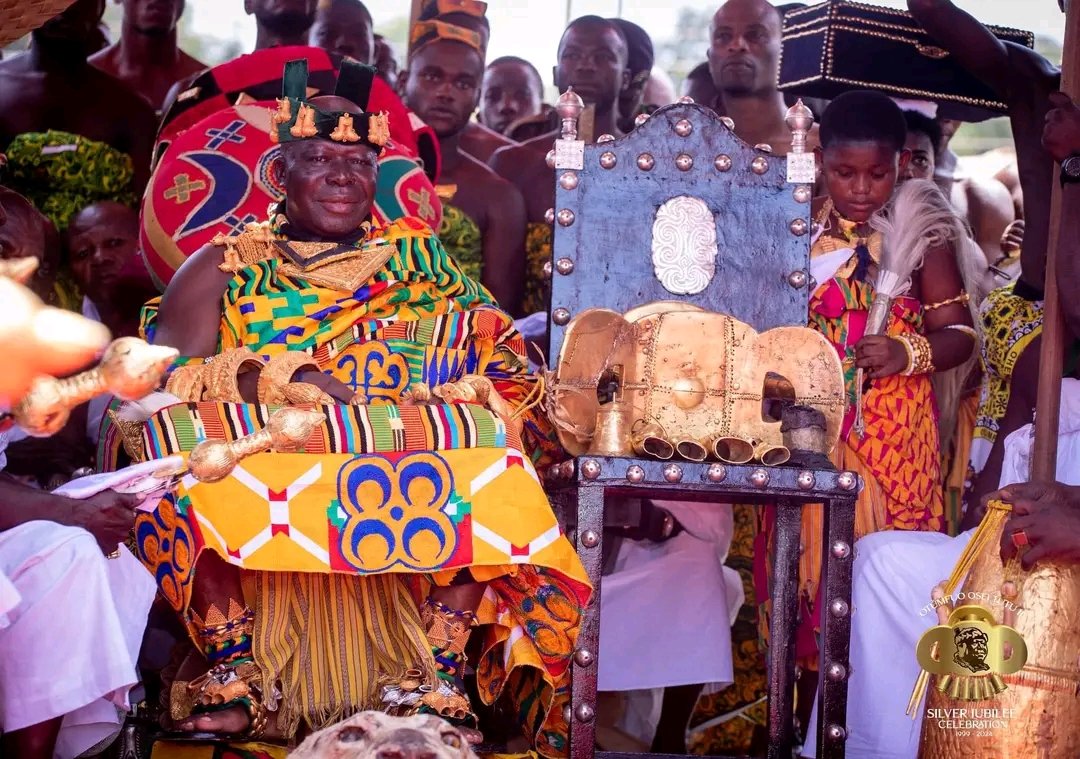The revered ‘Sikadwa’ (Golden Stool) was on display at Manhyia at the Akwasidae festival, signifying a historic and momentous occasion.
On Sunday, May 12, 2024, the air in Kumasi, the cultural capital of Ghana, was heavy with reverence and anticipation as the city not only celebrated the sacred Akwasidae festival but also the culmination of the 25th anniversary of His Majesty Otumfuo Osei Tutu II, the Asantehene.
The most treasured possessions in the Kingdom, the Golden Stool is kept in a hallowed location and is only displayed on exceptional occasions.
At the grand durbar, the Asantehene, Otumfuo Osei Tutu II, celebrated his silver jubilee with an outdoor display of the Golden Stool, otherwise known as “Sika Dwa Kofi,” the highest and most revered seat in the Asantes.
The stool believed to have been conjured from the heavens by the revered Asante priest, Okomfo Anokye, was part of the full traditional procession of the Asantehene at the Akwasidae festival.
According to legend, Okomfo Anokye, a high priest caused the Golden Stool — sika dwa in the Akan language of the Asante — to descend from heaven in a cloud and landed on the lap of the first Asante king, Osei Tutu.
The Golden Stool, the sacred symbol of the Asantes; believed to possess the sunsum (soul) of the Asante people.
Such seats were traditionally symbolic of a chieftain’s leadership, but the Golden Stool is believed to house the spirit of the Asante nation—living, dead and yet to be born.
Watch the video below
The grand durbar to climax the Asantehene’s silver jubilee is happening on the Akwasidae festival in the Asante calendar.
President Akufo-Addo and his vice president, Dr. Mahamudu Bawumia, were among the thousands of guests and officials who attended the event.
THE GOLDEN STOOL OF THE ASHANTI KINGDOM. “SIKA DWA KOFI”.
The Golden stool known in local Ashanti Twi parlance as “Sika Dwa Kofi” is the throne which embodies the Ashanti Kingdom’s royal heritage and is the symbol of strength, power and authority.
About 300 years ago the great Chief Priest Okomfo Anokye according to Oral tradition conjured the Golden stool from the sky at a durbar. Where all the Chiefs of Asanteman were gathered. The stool upon being conjured landed on the lap of the first Asante King, King Osei Tutu I. The stool was conjured on a Friday that’s why it’s called Sika Dwa Kofi which means “Golden stool born on Friday”. The Golden stool is believed to house the spirit of the Asante nation- living,dead and yet to be born.
Legend has it that the great Chief Priest Okomfo Anokye said that ” if the Golden stool was ever to be destroyed or captured by the enemies of the Asante Kingdom of Ghana, the whole kingdom would descend in chaos”. The statement was a great warning giving by Okomfo Anokye.
The Golden stool’s main purpose was to unite the Asante people and makethe Ashanti Kingdom great,mighty and united. All the Chiefs of the Asante Kingdom had to swear an oath not to turn their backs on Nana Osei Tutu who was the first king of the Ashanti Kingdom. Okomfo Anokye told all the Chiefs of the Ashanti Kingdom to cut a small portion of their hair and nails this was collected and burnt into ashes. The ashes was then smeared on the golden stool and the remaining portion was mixed with Palmwine for all the Chiefs to drink. Nana Osei Tutu took an oath of allegiance to the Golden stool and all Chiefs each of them,in turn,took an oath of allegiance to Nana Osei Tutu and the oath never to raise arms against the Golden stool.
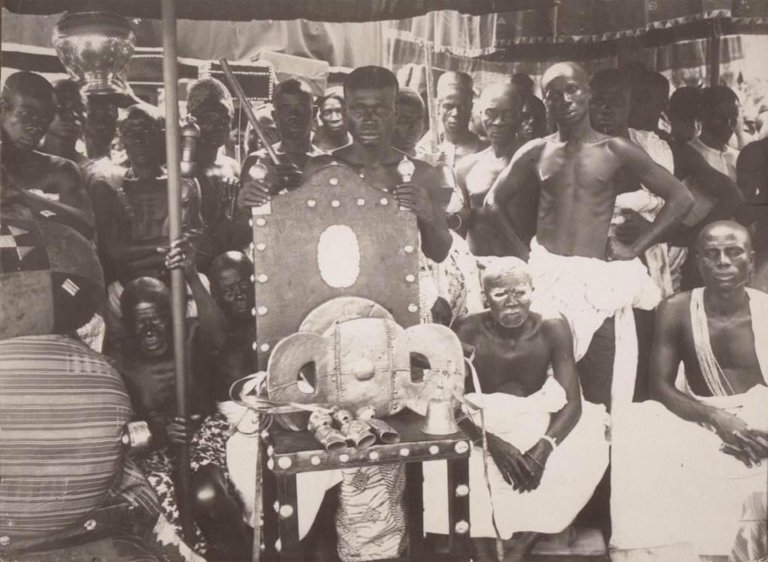
THE GOLDEN STOOL
The Golden stool is a carved seat 46cm high with a platform 61cm wide and 30cm deep. The Golden stool’s entire surface is inlaid with gold and hung with bells to warn the king of impending danger. The Golden stool is a symbol of nationhood,and because it contains the soul of the Asante ,the Golden stool is considered to be scared that no person whatsoever is allowed to sit on it.
It is kept under tight security and is taken outside only on special and exceptionally grand occasions. It must never come in contact with the earth or the ground as such,the Golden stool has it’s special stool which it sits or on the skin of an animal such as a Leopard.
Replicas of the Golden stool have been produced for the Ashanti Chiefs and at their funerals,they are ceremonially blackened with animal blood,a symbol of their power.
THE CONFLICT REGARDING THE GOLDEN STOOL.
The Golden stool resulted in a great war that ensued between the Asante and British.
In 1896,the Asante allowed their King Prempeh I, to be deported rather than risk loosing a war and the Golden stool in the process.
In 1900,the Governor of the Gold Coast, Sir Frederick Hodgson, demanded to sit on the stool. The Asante remained silent and when the assembly ended, they went home and prepared for war .Although they were finally conquered by the British, who had help from Yoruba fighters the Asante claimed victory because they fought to preserve the Golden stool they had .This war is popularly known as the Yaa Asantewaa War.
In 1920, A group of African Road builders accidentally found the Golden stool and stripped off it’s gold ornaments. The workers were tried according to traditional custom and the death sentence was imposed. But the British intervened and the death sentence was communed to perpetual banishment.
 MYGHANAMEDIA.COM Best Source Of Latest News
MYGHANAMEDIA.COM Best Source Of Latest News
